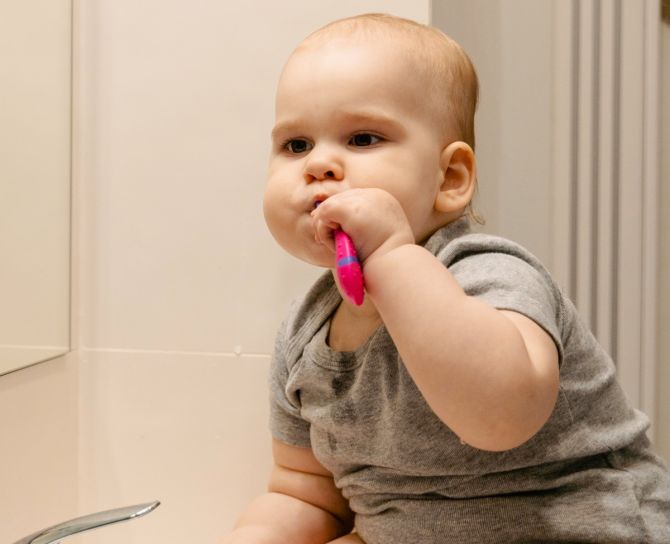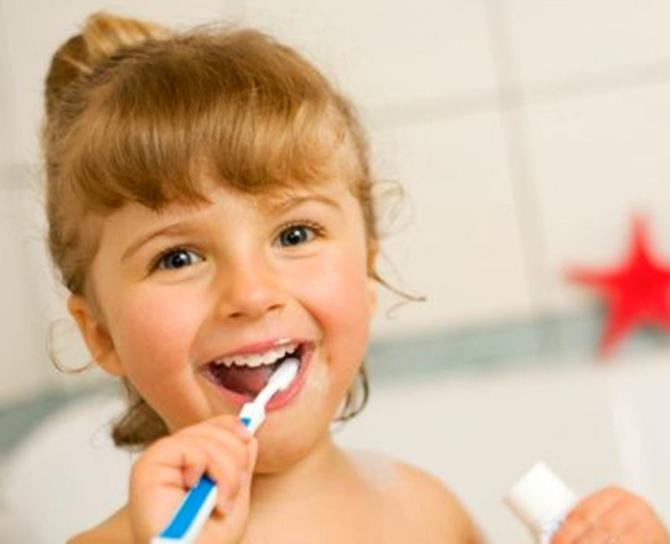Dr Rohit Mistry suggests five dental hygiene habits young mothers should start their babies/kids.

Developing good oral hygiene habits at an early age is important for maintaining healthy teeth and gums throughout life.
Follow these simple tips to guide your children and build a healthy dental routine.
1. Brushing and oral hygiene maintenance
Good oral hygiene habits should be established from an early age to promote healthy teeth and gums for life. Here are some basics for infants, toddlers, kids, and adolescents:
Infants (0-12 months): Clean your baby's gums with a soft, damp (not soaking wet) cloth/gauze (clean) after feedings to remove bacteria and prevent the buildup of plaque.
Once the first tooth erupts, start brushing it with a soft-bristled toothbrush and a small amount of non fluoridated toothpaste.
Toddlers (1-3 years): Encourage your toddler to brush their teeth twice a day with a small amount of fluoride toothpaste.
The quantity of toothpaste according to the Australian Dental Association must be merely a smear (grain of rice sized).
Supervise brushing to ensure that all surfaces of the teeth are cleaned. No munching after brushing at night.
Kids (4-12 years): Continue to supervise your child’s brushing (a pea sized amount of toothpaste and soft bristle brushes) and flossing, and encourage them to brush for at least two minutes twice a day.
Adolescents (13-18 years): Encourage your teenager to continue brushing and flossing regularly, and to use mouthwash if necessary. With improved dexterity individuals can start using dental floss.
2. Flossing
Flossing is another important oral hygiene habit that children should learn at an early age.
Flossing helps to remove food particles and plaque from between the teeth, where the toothbrush can't reach.
Parents can start flossing their child's teeth as soon as two teeth touch each other.
When children are old enough to floss on their own, they should be encouraged to floss at least once a day.
Parents can show their children how to floss by wrapping the floss around their fingers and gently sliding it between the teeth.
Children may find flossing difficult at first, but with practice, it will become easier.
3. Dietary habits
Eat fibre rich food, fruits and nuts. Sugar in fruits is natural and within limits are less harmful when compared to processed juices and foods.
Micronutrients like vitamins D (good early morning sunlight exposure), calcium (dairy products, nuts, green leafy), vitamin C (citrus fruits, bell pepper, broccoli) and E (spinach, almonds, carrots) are essential to maintain the integrity of oral health.
Eat foods rich in these nutrients. When its comes to staying away from foods that are deleterious to your oral health, your arch enemy is processed foods (augment the growth of harmful bacteria), sugar rich food (encourages plaque accumulation), carbonated drinks (weakens your teeth).

4. Regular Dental Check-ups
It is a myth that milk dentition does not require care as they will be succeeded by permanent dentition, the early-stage growth stage of oral tissues and the masticatory system starts before the birth even though the first teeth show up 8-9 months after birth.
The permanent dentition starts to develop when a baby is born and multitudes of factors work in tandem so that both the dentitions are healthy.
Sometimes voluntary or involuntary negligence of routine care leads to grave problems which require long term treatments.
Take your child for routine dental visits and this will ensure:
- Individuals not anxious of dental treatments.
- Early catch of initial decay.
- To keep in check if the dentition is exfoliating on time and normally.
- To diagnose and break deleterious habits.
- Caries prevention modalities like topical fluoride application are carried out in office settings.
5. Use Mouthwash
Mouthwash can help kill bacteria in the mouth and freshen breath.
Children can start using mouthwash at an early age, but parents should choose a mouthwash that is appropriate for their child's age.
Mouthwash that contains alcohol should be avoided for young children, as it can be harmful if swallowed.
Children should be supervised while using mouthwash to make sure they don't swallow it.
Parents can also help their children learn to swish the mouthwash around their mouth for the recommended amount of time, usually around 30 seconds.
Talk to your dentist to figure the type of mouthwash best suitable for you.
Dr Rohit Mistry is prosthodontist and implantologist at Apex Dental Care.
Disclaimer: All content and media herein is written and published online for informational purposes only. It is not a substitute for professional medical advice. It should not be relied on as your only source for advice.
Please always seek the guidance of your doctor or a qualified health professional with any questions you may have regarding your health or a medical condition. Do not ever disregard the advice of a medical professional, or delay in seeking it because of something you have read herein.
If you believe you may have a medical or mental health emergency, please call your doctor, go to the nearest hospital, or call emergency services or emergency helplines immediately. If you choose to rely on any information provided herein, you do so solely at your own risk.
Opinions expressed herein cannot necessarily provide advice to fit the exact specifics of the issues of the person requesting advice.
Feature Presentation: Rajesh Alva/Rediff.com









